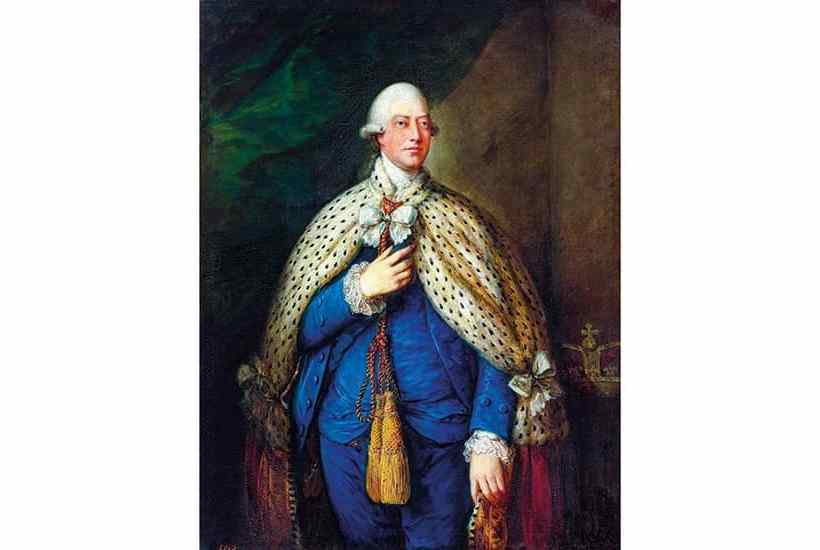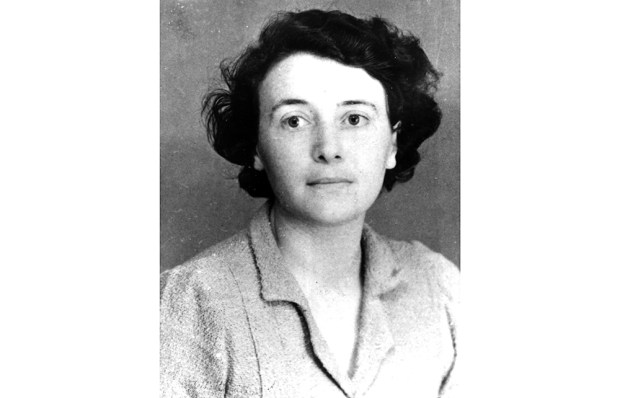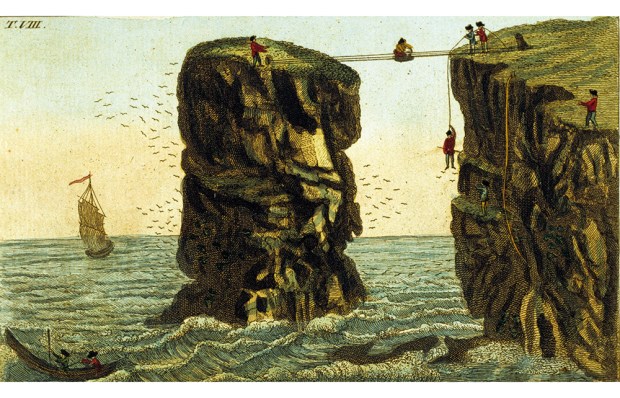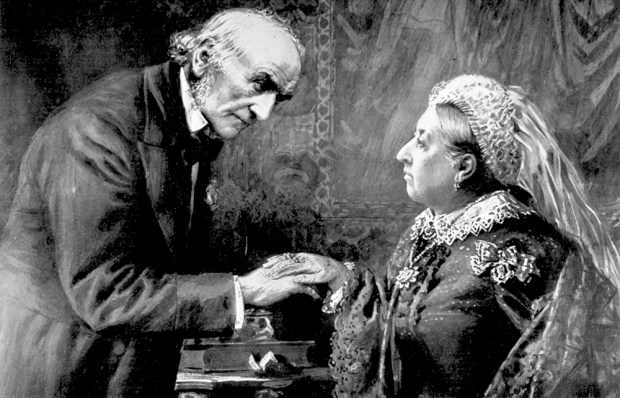Every British historian has a story about the witlessness of Americans when it comes to our Georgian kings. The fate of Alan Bennett’s play The Madness of George III is notorious — Hollywood turned it into a film entitled The Madness of King George, in part lest American audiences assume it a tertiary sequel to The Madness of George I. A few years ago I encountered a highly educated editor at a reputable American news outlet who was under the impression that George V and George VI were ‘Hanoverian’ sovereigns, for surely they had been the son and grandson of George IV.
I have deep sympathy, therefore, with the impulse behind Andrew Roberts’s biography of George III. The author sets out explicitly to rescue our third Hanoverian king from wilful American ignorance — and golly, is there plenty of that around. The claims Roberts makes for his hero are occasionally grandiose: in a subtitle evidently framed with one eye on the press release, George is billed as ‘Britain’s Most Misunderstood Monarch’. (The shades of Mary Tudor, Richard III of England, or even Macbeth of Scotland might have comments.) But Roberts begins his account of George’s life and legacy with a litany of quotations from contemporary American media, and reading this list of ultra-nationalist mendacities it is hard to deny that George has had an unfair press in his former colonies. Bennett’s play-turned-film offered a more sympathetic portrait, but America, it seems, still sees this ‘power-mad little petty tyrant’ as the personal embodiment of British authoritarianism, a totem against which the American rebellion in 1775 was both justified and inevitable. Roberts makes it his mission to prove them wrong.
Instead, the George III described by Roberts is a thoughtful, patrician defender of the British constitution and its exceptional liberties. (As with dogs and their owners, the subjects of biographies are notorious for growing to resemble their authors.) Most of this is convincing. George was the first Hanoverian born in England, passionately patriotic and fascinated by English political traditions — foremost among them the institutional balance of powers that American revolutionary theorists would later claim as their own founding principle.
Roberts has analysed 8,500 pages of George’s schoolboy essays, including appreciative tributes to John Locke and to Montesquieu’s The Spirit of the Laws, which so many of the Founding Fathers would cite as their own lodestar. George’s failure to hold America owed more to his refusal to rule as a dictator than to tyranny: too liberal in allowing seditious ideas to circulate; too gentle to force from his parliament the taxes which might have paid for a harder British fight; too much excluded from military decisions by the charming Lord North and ghastly George Germain, 1st Viscount Sackville.
Roberts concedes that George took his eye off the American ball in the late 1760s and early 1770s. Warning bells should have sounded during the crisis surrounding the Stamp Act of 1765, which imposed unpopular new taxation — George was suffering a serious psychotic episode, a harbinger of the ‘madness’ to come, but he was soon functional enough to make plans for his son’s regency and, as Robert accepts, he had ‘plenty of sane and normal interludes’ in which he failed to query the Act.
Nonetheless, the American cry of ‘No taxation without representation’ was ‘essentially meaningless as a revolutionary slogan’, given that the self-styled representatives of the revolutionaries had themselves, at the Stamp Act Congress of 1765, affirmed that ‘from their local circumstances’ the American colonies could not and should not be represented in London’s House of Commons. In his own way, Roberts agrees with them: without a new centre of power on American soil, full American representation on the British model was always going to be impossible. American independence was the natural consequence of geographical reality. Perhaps it saved Britain from a hapless 19th-century fate as a satellite of its own colony, the dominant partner in name only. Whatever else, it was not the consequence of George’s supposed tyranny.
George earns our personal sympathy. He was pious, proper and faithful to his wife, beloved by the servants who knew him most closely, and a survivor of childhood horrors. When his father Frederick, Prince of Wales died at the age of 44, Frederick’s own father George II celebrated, and allowed the prince’s corpse to putrefy unburied until the stench reached the young boy’s bedroom. In George’s treatment of other men, Roberts praises him for ‘defying the vicious prejudices of the day against homosexuality and bisexuality’ although, curiously, he sidesteps any real engagement with the distinct 18th-century understanding of sexuality.
Roberts’s case that ‘Farmer George’ was also a great man of culture is perhaps less compelling. Caroline Herschel’s grateful thanks for gifting her brother William a telescope can hardly be considered a disinterested witness statement, as Roberts presents it, in its praise for George as ‘the best of kings, who is the liberal protector of every art and science’. It is far from the only moment where Roberts allows himself to stretch the reliability of historical testimony which affirms his heroes. In one early passage we are told that a ‘near-contemporary’ of Prince Frederick (1707-1751) had attested to his willingness to patronise ‘the cottages of the poor, listen with patience to their twice-told tales, and partake with relish of the[ir] humble fare’. This ‘near-contemporary’ was in fact the 19th-century John Doran (1807-1878).
If Prince Frederick and George III are the idealised heroes of this story, its true villains are not misguided Americans but British Whig historians. Roberts is the great Tory historian of our day. No surprise, therefore, that he blames George’s misrepresentation not only on American mythmakers — though the musical Hamilton comes in for affectionate chiding — but on the long tradition of historians ideologically committed to George’s Whig enemies. So eager is Roberts to rebut Whig propaganda that he reminds us, repeatedly, that George was far from a Tory stooge. Nonetheless, George’s grandfather had permitted the entrenchment of Whig hegemony, to which both George, and Frederick before his death, presented a more independent-minded challenge. It’s a delight to see the waspish misogynist Horace Walpole receive a well-deserved kicking for ‘compulsive mendacity’. But critiquing Whig historians is hardly counter-cultural today. Where Roberts attacks from the right, the lefty consensus of contemporary academia has long dismissed Whig history, with its own grand narrative of English exceptionalism, as ‘neo-liberal’ and ‘colonialist’. Are anyone’s alternative prejudices so appealing? The 18th-century Tory dream of a strong monarch safeguarding the interests of the ‘people’ against a bourgeois oligarchy, admiringly reflected by Roberts in his precis of Viscount Bolingbroke’s influential 1738 pamphlet, The Idea of a Patriot King, occasionally feels like a harbinger of Trumpism.
Roberts’s personal monarchism is also on show. He praises the Queen for releasing new material on George III which shows her ancestor in a favourable light — if only the Royal Archives could show the same transparency with Edward VIII’s papers -— and quotes insights by the current Prince of Wales.
Yet what will most infuriate many a left-wing academic about Roberts — and for this we should salute him — is that he does his scholarly homework. This is a compendious product of intricate investigation. Roberts has read everything, including the complex medical research which makes clear, in his careful synthesis, that George’s ‘madness’ was bipolar disorder rather than porphyria. The letters and diaries of delicious characters such as Fanny Burney and Lady Mary Coke are combed for colour and detail, and troop movements and economic fluctuations are carefully reconstructed. It is a magnificent achievement.
Got something to add? Join the discussion and comment below.
Get 10 issues for just $10
Subscribe to The Spectator Australia today for the next 10 magazine issues, plus full online access, for just $10.
You might disagree with half of it, but you’ll enjoy reading all of it. Try your first month for free, then just $2 a week for the remainder of your first year.














Comments
Don't miss out
Join the conversation with other Spectator Australia readers. Subscribe to leave a comment.
SUBSCRIBEAlready a subscriber? Log in